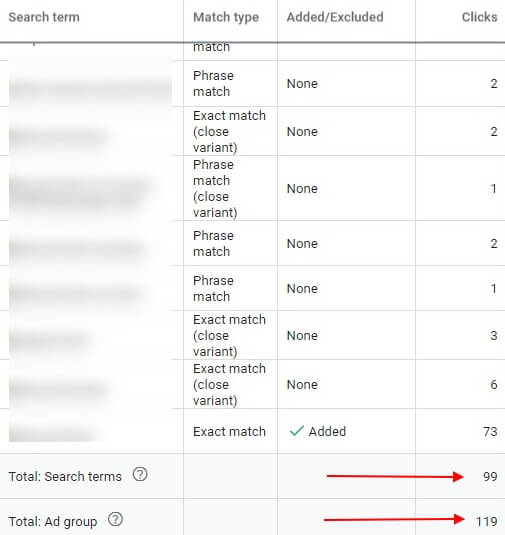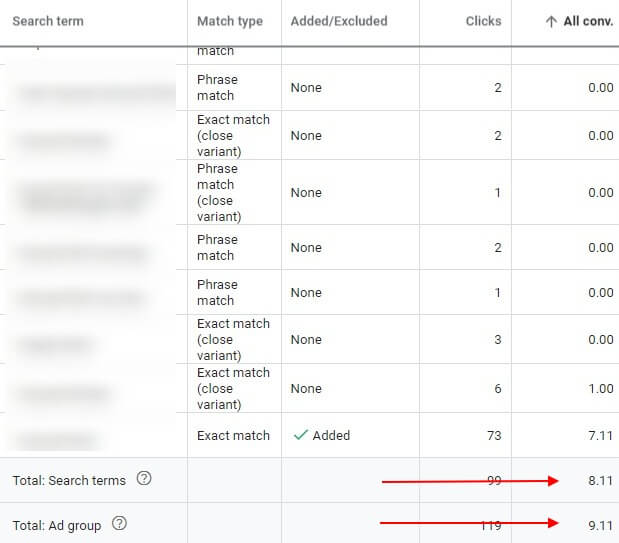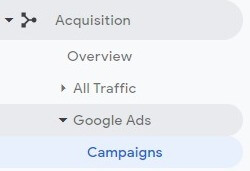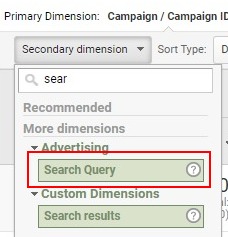Google is concealing your search terms, and it is bad

Let’s first read the following premise: For successful optimization and revenue-generating Google Ads campaigns, you need access to ALL search terms for which users clicked on your ads.
It’s simple logic. You want to know what users searched for when they clicked on your ads, and then converted. Am I right?
Not if you ask Google about it. Read on and find out why Google is behaving f…[CENSORED] bad with this one.
Why doesn’t Google show all search terms?
Google has decided to not show all the search terms for which users (customers) clicked on your ads in the search terms report. The explanation for this is, and I am going to carefully choose words here, funny.

To quote Google here:
“This only includes terms that were used by a significant number of people to search.”
The most important thing here is the “significant number of people”.
But what number is significant? Two? Ten? Twenty?
Over what time? Week? Month?
But never mind those questions. Let’s consider this…
Did you know that around 15% of all daily searches on Google are new?
Never before seen!
Never before searched for!
For the sake of this blog post, let’s imagine that we are targeting all searches on Google with our Google ads. Around 15% of all searches are first-time occurrences and because of that, we will probably not see them in our search terms report.
By the way, there are around 4.5 billion (4.500.000.000) Google searches daily. 15% of that is 675 million (675.000.000).
675 million totally new searches every day.
If we want to optimize our campaigns – can we really do our job without those “insignificant” number of people/searches?
No, we can’t.
Google’s explanation is funny because there is NO “insignificant” number of people. Read on for the proof of this statement.
How bad can it be?
The impact of this can range from very small to being very, very bad.

In the above example, we DON’T SEE around 16% of all search terms! Google thinks that those search terms we are not seeing are insignificant. Are they?
Let’s look at the same example, only now let’s focus on the number of conversions:

One of those “insignificant numbers of people” converted! But, because of Google, I can not see for which search term.
Let us imagine this: every month there is a certain search phrase for which we will make money (conversions). We can not see that search phrase. During the entire year, there could be 12 conversions for those search terms which we can not see. And we can not do anything about it. We can not optimize our ad groups nor our ads for it.
Funny, isn’t it?
Is there a solution to see all search terms?
At the moment – there is. But I am afraid how much longer will we be able to use it.
We can go to our Analytics account, and under Acquisition choose Google Ads and then Campaigns.

After that just use the secondary dimension and choose Search Query.

There is also an option to directly choose Search Queries under Google Ads, but on some accounts, I have seen the same results as in the Google Ads system. So I’m recommending to use the secondary dimension under Campaigns.
The future is targeting without keywords
I must confess that when I first saw this problem, I thought it was a bug. As time passed I was increasingly starting to ask myself: WTF? Why is Google doing this?
This is simple denial of information necessary for us to optimize our campaigns. I realize that not all marketing agencies are doing this type of optimization (only the best ones are doing it), but that can not be the reason.
Unless there is something else in play.
What if Google is preparing the stage for no-keyword-targeting Search campaigns?
Campaigns in which we will only include our landing page and select interesting audiences. No targeted keywords or negative keywords. Of course, smart bidding will then decide when our ad will show up.
I personally have no problem with smart bidding – but what I do want is more control over our campaigns, so we can properly optimize them and show that we can still do a better job than any machine. 😉
What do you think?
Is this a bug?
Or is this a (future) feature?



2 comments
Hi, Google appears to have blocked this ability as we can no longer see the hidden search terms on analytics. Is there any other way of finding these search terms? Thanks
Hi Nasser,
I have just checked all accounts – we still can see all search terms in analytics.
But, I am afraid that this will soon happen to all accounts – Google will not want to give us all information on which we can optimize our campaigns.
Unfortunately, I am afraid that there is no other way to get all search terms.